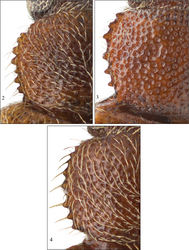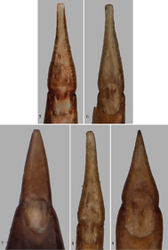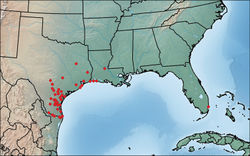Paratenetus texanus
| Notice: | This page is derived from the original publication listed below, whose author(s) should always be credited. Further contributors may edit and improve the content of this page and, consequently, need to be credited as well (see page history). Any assessment of factual correctness requires a careful review of the original article as well as of subsequent contributions.
If you are uncertain whether your planned contribution is correct or not, we suggest that you use the associated discussion page instead of editing the page directly. This page should be cited as follows (rationale):
Citation formats to copy and paste
BibTeX: @article{Bousquet2014ZooKeys415, RIS/ Endnote: TY - JOUR Wikipedia/ Citizendium: <ref name="Bousquet2014ZooKeys415">{{Citation See also the citation download page at the journal. |
Ordo: Coleoptera
Familia: Tenebrionidae
Genus: Paratenetus
Name
Paratenetus texanus Bousquet & Bouchard sp. n. – Wikispecies link – ZooBank link – Pensoft Profile
Type material
Holotype (♂) labeled “Port Isabel, Tex. 20.X.1982 Lot 2 BF&JL Carr / Holotype Paratenetus texanus Bousquet & Bouchard CNC No. 24133.” The specimen is deposited in the CNC.
Paratypes from the following localities: Texas. Port Isabel, 17.X.1982, 20.X.1982, 30.III.1987, BF&JL Carr (6, CNC). 18 mi. E of Hebbronville, 25.III.1987, BF&JL Carr (10, CNC). Cameron Co., Brownsville, 19 July 1981, W.E. Steiner (2, USNM). Cameron Co., Palmito Hill Hist. Site, Hwy. 4 east of Brownsville, 12-X-1993, S.M. Clark (2, RLAC). Cameron Co., 11 mi. W Boca Chica, 28 Sept. 1976, R. Turnbow (3, FSC). Hidalgo Co., Mission, Bentsen State Park, 17 (or 18) July 1981, W.E. Steiner (2, USNM). Hidalgo Co., Anzalduas Co. Pk., 19 Oct. 1985, Wappes & Downie (2, FSC). Bee Co., Beeville, 19 June 1974, W.E. Steiner (1, USNM).
Etymology
The specific name derives from the name of the state of Texas where the species has been commonly collected.
Diagnosis
Members of this species can be distinguished from those of Paratenetus punctatus and Paratenetus exutus in having the punctures on the pronotum sparser, not subcontigous even on the lateral half. They can also be distinguished from most adults of Paratenetus punctatus by their smaller size and from most adults of Paratenetus exutus by the subquadrate antennomere 8 and metaventrite of same color as the first two abdominal ventrites.
Description
Body dorsally yellow to pale reddish brown, with the pronotum and head usually slightly darker than elytra and legs; antennal club slightly darker than antennomeres 1–8 in many specimens, often reddish brown to partially piceous, yellowish and as pale as legs in some specimens; metaventrite not darker than first two abdominal ventrites. Antennomere 8 subquadrate. Pronotum with maximum width at midlength (Fig. 4); punctures moderately dense, not subcontiguous even over lateral half. Elytra less convex than Paratenetus gibbipennis and Paratenetus fuscus; slanting setae subdepressed, erect setae short. Metaventrite long, length along midline longer than length of abdominal ventrite 2 along midline. Male protibia with calcar near middle along ventral surface; male mesotibia with short, preapical spine, wide at base and oriented perpendicularly to long axis of tibia. Parameres with sides distinctly convergent towards apex; apex markedly acute (Fig. 9).
Length: 2.7–3.3 mm.
Distribution
This species is known from southeastern Florida, central Louisiana, and central and eastern Texas (Fig. 14). We have also seen specimens from the states of Chiapas, Nayarit and Tamaulipas in Mexico.
Records
We have seen 515 specimens, including the type material, from the following localities. United States of America. Florida. Dade Co.: Miami (FSC). Louisiana. Avoyelles Parish: Mansura (USNM). Cameron Parish: Holly Beach (LSAM, TAMU); nr. Oak Grove (TAMU). Texas. “60 mi SE Cotulla” (CNC). “15 mi SW Jct FR 3073 & Hwy 16” (CNC). Anderson Co.: Elkhart (TAMU). Aransas Co.: Goose Island St. Park (LSAM, TAMU). Atascosa Co.: Pleasanton (USNM); Campbellton (TAMU). Bastrop Co.: Bastrop St. Pk. (FSC). Bee Co.: Beeville (USNM); Pettus (CNC). Bexar Co.: San Antonio (USNM). Brooks Co.: Falfurrias (CNC); 9 mi W Falfurrias (TAMU). Cameron Co.: Boca Chica (CNC, TAMU); 6 mi W Boca Chica Beach (TAMU); 6.7 mi W Boca Chica Beach (TAMU); Brownsville (CNC, CUIC, MCZ, TAMU, USNM); 4 mi ESE Brownsville (TAMU); 6 mi E Brownsville (TAMU); 10 mi E Brownsville (RLAC, LSAM); 12.5 mi E Brownsville (TAMU); 13.5 mi E Brownsville (TAMU); W of Harlingen (TAMU); Main Reservoir near Brownsville (RLAC); Resaca de las Palomas St. Pk. (RLAC); Resaca de La Palma St. Pk. (TAMU); Sabal Palm Grove Wildlife Sanctuary (RLAC, GMNH, LSAM, TAMU); nr. Southmost (USNM); ca. 2 mi E Los Fresnos (TAMU); Laguna Atascosa NWR (TAMU); 9.7 mi E jct Rt 1419 on hwy 4 (TAMU). Chambers Co.: Anahuac (USNM). Duval Co.: San Diego (USNM); Freer (TAMU); Sepulveda Ranch (TAMU); 3.5 mi S Realitos (TAMU). Fort Bend Co.: Brazos Bend St. Pk. (TAMU). Galveston Co.: Virginia Point (USNM); San Luis Pass (TAMU); 3.5 mi SW Jamaica Beach (TAMU); 7 mi SW Jamaica Beach (TAMU). Goliad Co.: Goliad (USNM). Hidalgo Co.: Santa Ana Nat. Wdlf. Ref. (LSAM, TAMU, USNM); Bentsen Rio Grande Valley St. Pk. (LSAM, TAMU); Anzalduas Park (TAMU); Delta Lake (TAMU). Jefferson Co.: 10 mi W Sabine Pass (TAMU). Jim Wells Co.: Ben Bolt (CNC); 1 mi N Ben Bolt (TAMU); Alice (USNM); 5 km W Alice (CMN); 1 mi N Premont (TAMU); 1.4 mi S Premont (TAMU). Karnes Co.: 1 mi NE Runge (TAMU). Kendall Co.: Boerne (USNM). Kenedy Co.: Sarita (CNC); 2 mi S Sarita (TAMU); 13 mi S Sarita (TAMU); 25.3 mi S Sarita (FSC); 31.8 mi S Sarita (TAMU); Armstrong (CNC); 1 mi S Armstrong (TAMU); Norias (TAMU); 5 mi N Norias (TAMU); 6 mi S Norias (TAMU); 8 mi S Norias (CNC); Loyola Beach, Baffin Bay (CNC); Baffin Bay (TAMU). Kleberg Co.: Kingsville (CUIC, TAMU); Riviera (CNC, TAMU); Riviera Beach (CMN); Velederos Creek (TAMU). Live Oak Co.: 17 mi SW George West (TAMU). Nueces Co.: Corpus Christi (USNM, TAMU). Refugio Co.: 8 mi E Refugio (TAMU); 7 mi S Woodsboro (TAMU). San Patricio Co.: Sinton (USNM); nr. Sinton (CNC); 3 mi N Sinton (TAMU); 7 mi N Sinton (TAMU); Welder Wildlife Refuge (CMN, FSC, TAMU); Welder Wildlife Refuge, 17 km NE Sinton (CMN); Lake Corpus Christi St. Pk. (LSAM). Starr Co.: 1.5 m E Rio Grande City (LSAM). Tyler Co.: 4 mi E Spurger (TAMU). Willacy Co.: 8 miles SW Port Mansfield (TAMU). Mexico. Chiapas. El Aguacero, 16 km W Ocozocoautla (CMN); 5 km E Ocozocoautla (CMN); 2 km S Chicoasen (CMN); Cinco Cerros (CMN). Nayarit. 15 mi N Tepic (CNC). Tamaulipas. Mpio.San Carlos, Cerro del Diente (TAMU).
Remarks
The two specimens from Miami in Florida externally agree perfectly with those from Texas. One is a male and its genitalia are identical to those of specimens from Texas.
Males are more common in collections than females. Of 106 randomly selected specimens, 42 (40%) were females and 64 (60%) were males.
Specimens were collected in January (n=1), February (n=1), March (n=65), April (n=39), May (n=89), June (n=30), July (n=53), August (n=21), September (n=36), October (n=108), November (n=2), and December (n=6).
Labels on specimens read “at black light in Prosopis and Celtis forest, sandy soil” (6 specimens); “on Celtis” (1); “ex dry okra pod” (1); “cotton” (1); “collected on Celtis” (2); “fallen fruit Yucca treculeana” (1); “on flower Yucca treculeana” (2); “on Acacia Berlandieri Benth.” (1).
This new species occurs in Mexico and nine species have been reported from that country. We have examined the type material of the six species described by Champion and housed in BMNH, i.e., Paratenetus constrictus, Paratenetus corticarioides, Paratenetus nigricornis, Paratenetus punctulatus, Paratenetus tibialis, and Paratenetus villosus, and none of them are conspecific with those of Paratenetus texanus. The three species not seen are Paratenetus tropicalis Motschulsky, Paratenetus koltzei Pic, and Paratenetus mexicanus Pic.
Original Description
- Bousquet, Y; Bouchard, P; 2014: Review of the species of Paratenetus Spinola inhabiting America, north of Mexico (Coleoptera, Tenebrionidae) ZooKeys, 415: 23-51. doi
Images
|


